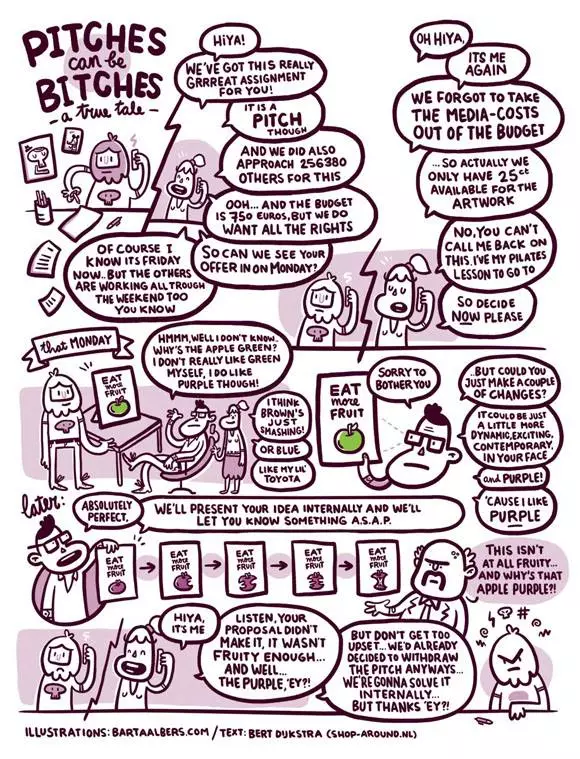Formal RFPs : 4 Ways to Guarantee the Responses You Want
It’s spring time (close enough) and you can smell the marketing and advertising RFPs getting ripe on the vine. They’re ready to be launched into the world seeking fruitful new agency partners and creative brilliance. Or at least, that’s the idea. If you’ve lived through the process on either side, you know that it rarely feels that way, it practically never runs on the timeline established and most parties involved come out looking and feeling more like a wilted violet than a spring daffodil.
Yet, we crazy agency new business folk live for this thrill. Competitive to the core, we all love a great challenge, the opportunity to solve problems and the thrill of holding a fresh, unopened RFP in our hands. We print it. Staple the corner perfectly. Make a flawless cup of coffee and settle in to review. No later than page three, we put it down and take to the Web to do our own research on your brand, you and what we think the task at hand might be. Don’t worry, we return to the RFP and answer it as you have requested, but we have to put it down just a few pages in because let’s be honest—99.9% of the time—it sucks!
As I’ve mentioned in previous posts, I haven’t always lived and worked on the agency side of the equation. So I know, preparing that RFP sucked for you too. But it doesn’t have to be so bad. And you can guarantee yourself far better responses if you implement the 4 tips outlined below.
- Get Organizational Clarity on What Your Business Goals Are and Share Them
Why do I mention organizational clarity? Because it is really important for the entire organization to be aware of what the goals for the brand are and equally as important to understand what the marketing team will be responsible for delivering in order to aid in the accomplishment of those goals.
Share this information. Better yet—if you don’t know it—figure it out before you issue an RFP. Seriously, a little short term pain will save you in the long run. If you don’t know these things no agency and no solution will ever possibly “hit the mark”. Agency Account Execs are experts at making things sound sexy and flashy, but when the rubber has to meet the road and you’re staring at your internal stakeholders who want to know why the $xxxxxxx you invested with Agency A didn’t deliver the results intended make sure the answer you have to give isn’t “because I never told them that was the mark they had to hit.”
And really, we all know you would never say that, instead you would fire Agency A and move on to Agency B. To ensure that you don’t end up in the same situation, make sure you fill Agency B in.
What does this sound like in an RFP? It could sound something like this for a b2b company,
In 2014, our organization is focused on reaching the following core goals:
· 60% increase in sales. To achieve this, marketing will be responsible for driving a 300% increase in qualified leads.
· Soft launch of our new service in Michigan, Ohio and Illinois capturing 30% market share. To achieve this, marketing will need to develop the launch strategy, implement that strategy and measure and report on market share at the end of Q4.
· Lower new client acquisition costs by 30%.
· Decrease client turnover rate by 10%. Marketing will be responsible for implementing a customer survey to understand why clients leave and constructing a presentation to inform the organization of these reasons along with suggested course of action for lessening this instance.
- The Budget. Have One. Share It.
There is a lot of thought on the client side for not sharing the budget during the RFP process. “What if they just don’t respond because they don’t think we’re big enough?” “We want everyone to come forward with the best solution and the best rate that they can give us.” “We don’t have a budget.” “We have no idea what something like this will actually cost.” “If we really like the idea, we can borrow money from somewhere else.”
I’ve heard them all. Hell, at one point, I said them all.
Your prospective agency partners need to know what the budget is, or at the very least, what a feasible range is. And there’s no secret agenda for why we need to know this. Here are the reasons:
a) We won’t answer the RFP if it appears that we won’t be able to come up with a solution that fits within your budget. And I know, on the client side that makes you want that proposal even more—but seriously—you don’t. It will just be a huge waste of your time. And ours.
b) There is more than one way to achieve a marketing objective and different channels require different investment levels. In order to come forward with the right response to your RFP, an agency needs to know what the guard rails are.
I promise you, there is no sneaky hidden sales agenda behind an agency asking you for your budget. Honest. If you don’t have one, give a reasonable range. Please. It will make this process better for you.
- Market Research: You Have It and Share (Some Portion of) It or the RFP Needs to Request It Be Conducted
The only way to run a successful marketing campaign, in any channel, is to fully understand your audience. You need to know, intimately, your current and prospective customer and what their perception of your brand is. You need to know your competitive position in the space. You need to know what the buying behavior of your target audience is.
And so does your agency. Sure, you scouted out agencies that had experience working with clients who target an audience very similar to your customer base. Sure, they have experience working with clients in your industry. So certainly they can make some very educated assumptions about the traits and behaviors of your customer—but if you force the agency to start making assumptions about how that presumed customer feels about your brand—you’re not going to get the response or the results that you want.
Assumptions are not a substitute for market research and the real data it delivers.
And fret not, I know the common client side argument against paying for market research is that you already know the brand and key stakeholders internally simply won’t justify investing in such a thing—the agency will make the case for it if it’s needed. And refer to the line above. We’ll make it irresistible. That’s our job. All you have to do is tell us what you already have.
Outdated research also doesn’t count.
- Define the Scope & Expected Deliverables
There isn’t too much explanation for this one. What are you expecting the agency to deliver as a result of your investment with them. Internally, have you agreed that you’re bringing an agency in for a website, campaign creative, a marketing strategy? Define it.
You’re right, we won’t stick to it. Chances are, we’ll make a good case and proposal for items that we think, based on your organizational goals and budget, you actually need in order to get there. That’s our job. But level the playing field and make sure you clearly outline what your intended project scope is. And be sure to mention currently contracted agencies and what part they will play, if any, in the outcome of this project. It won’t keep any of the agency players involved from spotlighting where they think one of your current partners might be missing an opportunity on your behalf, but it will make sure everyone knows their place going in.
Clients always ask, “do you play nice with other agencies?” The answer is always yes. But the cage match you’re dreaming of can only be avoided if you introduce us to one another and let us know who’s in charge.
Working on an RFP? Let’s talk? Or if you have it ready, I’ll start brewing that perfect cup of coffee if you want to send it my way (carly@oneupweb.com)! Happy competitive pitch season to all of our agency peers out there and to all on the client side, here’s hoping you get the response you want in the first round!
Spring. It’s tomorrow. Celebrate!

